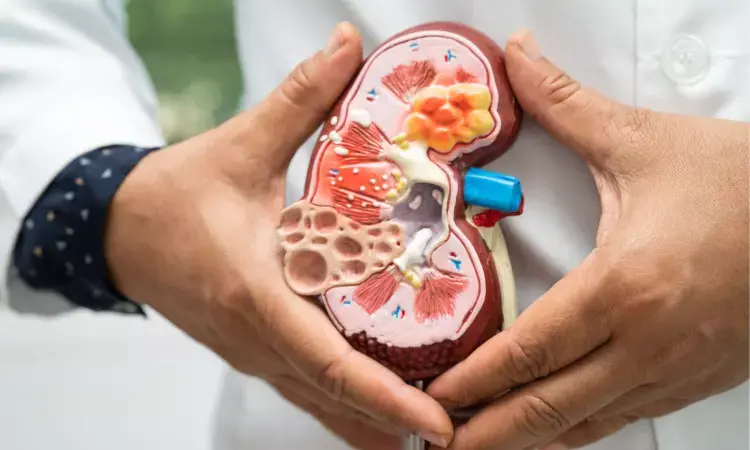- Home
- Medical news & Guidelines
- Anesthesiology
- Cardiology and CTVS
- Critical Care
- Dentistry
- Dermatology
- Diabetes and Endocrinology
- ENT
- Gastroenterology
- Medicine
- Nephrology
- Neurology
- Obstretics-Gynaecology
- Oncology
- Ophthalmology
- Orthopaedics
- Pediatrics-Neonatology
- Psychiatry
- Pulmonology
- Radiology
- Surgery
- Urology
- Laboratory Medicine
- Diet
- Nursing
- Paramedical
- Physiotherapy
- Health news
- Fact Check
- Bone Health Fact Check
- Brain Health Fact Check
- Cancer Related Fact Check
- Child Care Fact Check
- Dental and oral health fact check
- Diabetes and metabolic health fact check
- Diet and Nutrition Fact Check
- Eye and ENT Care Fact Check
- Fitness fact check
- Gut health fact check
- Heart health fact check
- Kidney health fact check
- Medical education fact check
- Men's health fact check
- Respiratory fact check
- Skin and hair care fact check
- Vaccine and Immunization fact check
- Women's health fact check
- AYUSH
- State News
- Andaman and Nicobar Islands
- Andhra Pradesh
- Arunachal Pradesh
- Assam
- Bihar
- Chandigarh
- Chattisgarh
- Dadra and Nagar Haveli
- Daman and Diu
- Delhi
- Goa
- Gujarat
- Haryana
- Himachal Pradesh
- Jammu & Kashmir
- Jharkhand
- Karnataka
- Kerala
- Ladakh
- Lakshadweep
- Madhya Pradesh
- Maharashtra
- Manipur
- Meghalaya
- Mizoram
- Nagaland
- Odisha
- Puducherry
- Punjab
- Rajasthan
- Sikkim
- Tamil Nadu
- Telangana
- Tripura
- Uttar Pradesh
- Uttrakhand
- West Bengal
- Medical Education
- Industry
Gut microbiota dysbiosis tied to progression of chronic kidney disease

Diet, drugs, and toxins affect gut bacteria, which can contribute to chronic kidney disease. Understanding the gut microbiota may lead to new ways to slow CKD progression.
According to a recent original paper on Nephrology published in International Urology and Nephrology, gut microbiota dysbiosis significantly affects CKD progression. CKD patients exhibit distinct microbial profiles, indicating the potential for microbiota-based interventions to slow CKD progression.”
Gut microbiota dysbiosis significantly contributes to the development and complications of chronic kidney disease (CKD). By comprehending the intricacies of the intestinal microbiota, this research endeavor holds the potential to offer novel perspectives on strategies to mitigate CKD progression.
This study analyzed the gut microbiota composition of 44 stage 3-4 CKD patients and 132 healthy volunteers. Faecal samples were collected, and 16 s rDNA sequencing was conducted to examine the gut microbiota composition.
The key points of this study are:
- Researchers reported altered diversity of intestinal microbiota in faecal samples in stage 3–4 CKD patients.
- Among the 475 bacterial genera, 164 were shared, while 242 dominant genera were exclusive to healthya subjects and 69 to CKD stages 3–4 samples.
- Healthy volunteers had a prevalence of intestinal Firmicutes and Bacteroidetes.
- CKD patients had a higher abundance of Proteobacteria and Actinobacteria.
- The presence of uncultured Coprobacillus sp. significantly aided the distinction between the two groups.
- ROC curve analysis distinguished microbiota with high diagnostic accuracy for differentiating CKD stage 3-4 patients from healthy people.
- Metabolic dominant pathway analysis found that healthy individuals had NADH dehydrogenase pathways, while stage 3-4 CKD patients had a phosphate acetyltransferase pathway. Additionally, CKD patients had more Gram-negative bacteria and facultative anaerobes.
- CKD cohort had a higher proportion of Gram-negative bacteria and facultative anaerobes.
Von et al. and colleagues said, “Our research emphasizes the significant impact of gut microbiota imbalances on chronic kidney disease (CKD) progression. The unique microbial patterns identified in CKD patients suggest that microbiota-focused interventions could effectively slow down CKD progression.”
Reference:
Yang, X., Cai, S., Gong, J. et al. Characterization of gut microbiota in patients with stage 3–4 chronic kidney disease: a retrospective cohort study. Int Urol Nephrol (2023). https://doi.org/10.1007/s11255-023-03893-7
BDS, MDS in Periodontics and Implantology
Dr. Aditi Yadav is a BDS, MDS in Periodontics and Implantology. She has a clinical experience of 5 years as a laser dental surgeon. She also has a Diploma in clinical research and pharmacovigilance and is a Certified data scientist. She is currently working as a content developer in e-health services. Dr. Yadav has a keen interest in Medical Journalism and is actively involved in Medical Research writing.
Dr Kamal Kant Kohli-MBBS, DTCD- a chest specialist with more than 30 years of practice and a flair for writing clinical articles, Dr Kamal Kant Kohli joined Medical Dialogues as a Chief Editor of Medical News. Besides writing articles, as an editor, he proofreads and verifies all the medical content published on Medical Dialogues including those coming from journals, studies,medical conferences,guidelines etc. Email: drkohli@medicaldialogues.in. Contact no. 011-43720751


